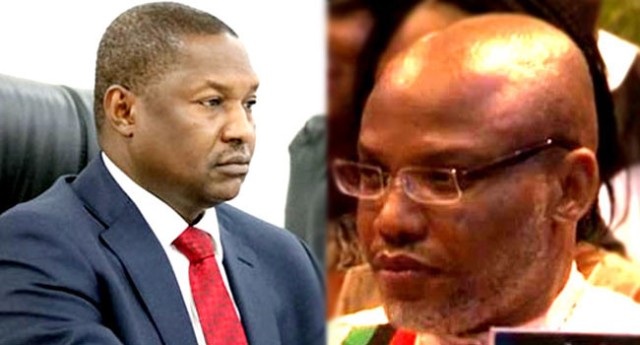The Court of Appeal sitting in Abuja yesterday nullified the terrorism charges brought by the federal government against the leader of the proscribed Indigenous People of Biafra (IPOB), Mr. Nnamdi Kanu.
However, the attorney general of the federation and minister of justice, Mr. Abubakar Malami, said the separatist leader still has some other cases to answer.
The court’s judgement followed an earlier ruling of the trial judge, Binta Nyako of the Federal High Court in Abuja, in April dismissing eight of the 15 amended counts filed against him by the federal government.
Delivering judgment in an appeal filed by Kanu, a three-member panel led by Justice Hanatu Sankey, in a unanimous judgment, held that the respondent who had failed to respond to the appellant’s submissions, conceded to the allegation that Kanu was forcefully renditioned from Kenya to Nigeria.
The judgment read by Justice Adedotun Adefope-Okijie held that it was necessary for the federal government to prove the legality of Kanu’s arrival to Nigerians.
The court held that Kanu’s extradition from Kenya in June 2021 to Nigeria without following the extradition rules was a flagrant violation of Nigeria’s extradition treaty and a breach of the IPOB leader’s fundamental human rights.
It held that there was no denial by the federal government’s counsel, Mr. David Kaswe, in the appeal as to the submissions of Kanu’s lawyer, Mr. Mike Ozekhome, that the IPOB leader was “extraordinarily renditioned from Kenya.”
The appellate court held that the failure of the federal government to adequately respond to Kanu’s arguments gave merit to the appeal.
The court further said also the Federal High Court failed to examine the findings of the prosecution as it would not have tried Kanu on the grounds that the IPOB leader was not “illegally brought into the country.”
The charges struck out included the ones instituted against Kanu before he was brought back to Nigeria last year.
Premium Times quoted the court as ordering Kanu’s release from the custody of the State Security Service (SSS), where the IPOB leaders has been held since he was brought back to Nigeria.
Ozekhome alleged that his client was forcefully abducted from Kenya and illegally brought back to the country.
He argued that under the “doctrine of speciality” as provided for in section 15 of the Extradition Act, the federal government ought to have proceeded to try Kanu on the initial five-count charge on which he was re-arraigned before he fled the country.
He argued that Kenya, being the country from where Kanu was arrested and extraordinarily renditioned to Nigeria, ought to have authorised his extradition and the new charges he is facing.
He further told the court that Kanu was first arraigned on December 23, 2015, and granted bail on April 25, 2017.
He explained further that agents of federal government (the respondent) had launched a military operation, code named “Operation Python Dance” at the appellant’s home town in September 2017, which forced him to escape out of the country, to Israel, then London.
He recalled that on June 27 2021, “the federal government forcefully arrested Kanu in Kenya and renditioned him back to Nigeria “in most cruel and inhuman manner”.
“On 29 June, 2021, the appellant was taken to court by the federal government, where he was re-arraigned.
“Following the appellant’s preliminary objection to the 15-count charge preferred against him by the federal government, the trial judge, Justice Binta Nyako of the Federal High Court Abuja, on April 8, 2022, struck out 8 counts.
“Our humble submission is that the remaining seven counts ought not to be retained by the trial court because, before the time Kanu was renditioned to Nigeria from Kenya, he was facing five-count charge”.
Ozekhome submitted that, going by section 15 of the Extradition Act, “Kanu is not supposed to be charged without the approval of Kenyan government.
“The remaining 7 counts cannot stand, being filed illegally without following due process under the rule of specialty as envisaged under section 15 of the Extradition Act.
“Counts 1, 2, 3, 4, 5 and 8, which were retained by the Federal High Court, were offences allegedly committed by the appellant (Kanu) before his forceful rendition to Nigeria.
“These allegations of rendition were never denied by the federal government and you cannot sustain the charge when you extradited the appellant without the approval of Kenyan authority,” he said.
In addition, Ozekhome argued that when charging for an offence, “you must mention the particulars and location where the office was committed.
“But in this case, the appellant was charged without stating where the offence was allegedly committed.”
He further contended that by section 45 (a) of the Federal High Court Act, with regards to criminal charge, the trial court does not have “global jurisdiction”.
More so, he said Section 195 and 196 of Administration of Criminal Justice Act (ACJA), states that a charge must have date, time, location etc.
He insisted that there was no need for the federal high court to retain the remaining 7 counts, and therefore urged the panel to take over the charges and strike them out.
Reacting to the judgement, Malami said Kanu was only discharged by the court but not acquitted.
In a statement signed and released Thursday night by Malami’s spokesman, Mr. Umar Gwandu, the attorney general said the court’s decision was on a single issue that bordered on rendition.
The statement added that there were other issues predating Kanu’s rendition “on the basis of which Kanu jumped bail” which remained “valid issues for judicial determination.”
The statement reads: “The office of the attorney general of the federation and minister of justice has received the news of the decision of the Court of Appeal concerning the trial of Nnamdi Kanu. For the avoidance of doubt and by the verdict of the Court, Kanu was only discharged and not acquitted.
“Consequently, the appropriate legal options before the authorities will be exploited and communicated accordingly to the public.
“The decision handed down by the court of appeal was on a single issue that borders on rendition.
“Let it be made clear to the general public that other issues that predates rendition on the basis of which Kanu jumped bail remain valid issues for judicial determination.
“The federal government will consider all available options open to us on the judgment on rendition while pursuing determination of pre-rendition issues.”





















































